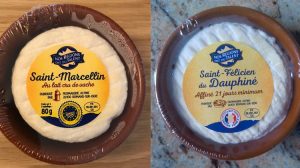Gabrielle Jones, Sophie Lefevre, et al report in Eurosurveillance that from 25 March to 27 April 2019, 19 suspected Shiga toxin-producing Escherichia coli (STEC) associated paediatric haemolytic uraemic syndrome (HUS) cases were notified by French hospital paediatric departments to Santé publique France, compared with 5–10 cases during the same period in previous years [1].
 Thirteen cases were confirmed as serogroup O26, with whole genome sequencing (WGS) underway for strain comparison. Initial epidemiological investigations using a trawling questionnaire identified the consumption of raw cow’s milk soft cheeses (Saint-Félicien and Saint-Marcellin) as the common link for eight of these 13 cases. Trace-back investigations using supermarket loyalty cards identified a common producer (producer A) of these cheeses for three cases and on the basis of this information a recall was initiated by French health authorities on 27 April 2019 [2]. As at 27 May 2019, investigations identified 16 outbreak cases including 14 paediatric HUS cases and two cases with uncomplicated diarrhoea (one child and one adult). Investigations are ongoing for one suspected case. The 16 outbreak cases reside in six administrative regions in France. All paediatric cases are under 5 years of age; the median age is 22 months (overall age range: 6 months–63 years). Eight cases are female. Date of symptom onset was between 31 March (week 13) and 29 April (week 18). All HUS cases were hospitalised. Thirteen cases received blood and/or platelet transfusion and seven underwent haemodialysis. Six cases had neurological complications, all of them received transfusions and three also had haemodialysis.
Thirteen cases were confirmed as serogroup O26, with whole genome sequencing (WGS) underway for strain comparison. Initial epidemiological investigations using a trawling questionnaire identified the consumption of raw cow’s milk soft cheeses (Saint-Félicien and Saint-Marcellin) as the common link for eight of these 13 cases. Trace-back investigations using supermarket loyalty cards identified a common producer (producer A) of these cheeses for three cases and on the basis of this information a recall was initiated by French health authorities on 27 April 2019 [2]. As at 27 May 2019, investigations identified 16 outbreak cases including 14 paediatric HUS cases and two cases with uncomplicated diarrhoea (one child and one adult). Investigations are ongoing for one suspected case. The 16 outbreak cases reside in six administrative regions in France. All paediatric cases are under 5 years of age; the median age is 22 months (overall age range: 6 months–63 years). Eight cases are female. Date of symptom onset was between 31 March (week 13) and 29 April (week 18). All HUS cases were hospitalised. Thirteen cases received blood and/or platelet transfusion and seven underwent haemodialysis. Six cases had neurological complications, all of them received transfusions and three also had haemodialysis.
The families of all 16 outbreak cases and the suspected case were interviewed about their at-risk exposures during the 10 days before symptom onset. Families of 16 cases (15 outbreak cases and one suspected case) reported the consumption of Saint-Félicien or Saint-Marcellin raw cow’s milk cheeses by either the case (n = 12) or household members (n = 4). One outbreak case did not report consumption of these cheeses. For the 16 cases with reported consumption of these cheeses, trace-back investigations using loyalty cards and supply data from the different shops where the caretakers reported purchasing the cheeses identified a link with producer A for 13 (all outbreak cases).
Producer A manufactured only Saint-Félicien and Saint-Marcellin cheeses. To date, no positive STEC O26 cheese or milk samples have been identified. Investigations, including sampling of the cheeses and trace-back of the milk supply chains, are ongoing.
Four outbreak cases had not consumed the cheeses themselves but a household member had. This suggests the affected child may have been infected via cross contamination (knives, cutting board, hands, etc.). None of the household members reported symptoms of illness, indicating that the cases were unlikely to have been infected by person-to-person transmission. Investigations are ongoing in an attempt to further document the exposures of these cases (consumption of cheeses or other food items cut by the knives or on the same cutting board as the suspected cheeses). Only one in 16 outbreak cases reported a family member with self-limiting diarrhoea (no stool analysis).
Note: If that many people developed HUS, hundreds could have potentially been sickened.
